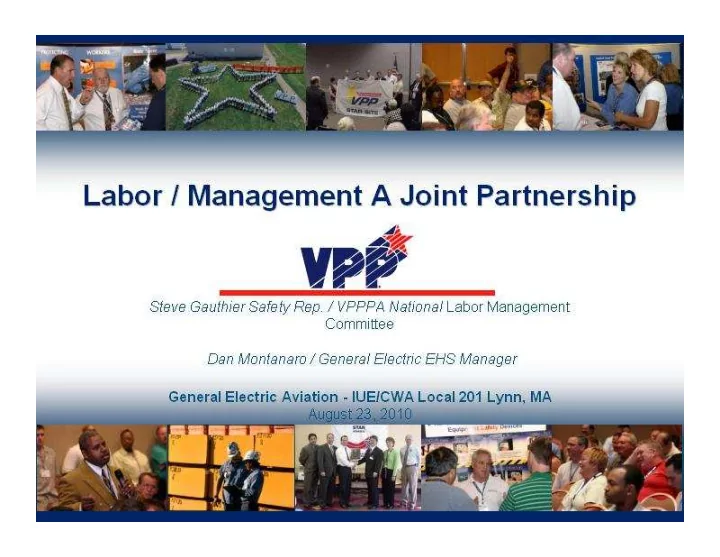

Received OSHA VPP STAR status August 2006 Recertification November 2009 Steve Gauthier IUE-CWA Elected Safety Rep. Dan Montanaro Site EHS Manager
Site Profile & Demographics • 221 Acres, 20+ Major Buildings ~120 year old plant • Production Scope - Aircraft Engines and Gear Manufacturing, Military, Commercial, M&I • 3287 Employees - 63% Represented – 4 Unions — IUE-CWA Local 201 (~1900 Members) — IFPTE Local 149 (Planners - 124 Members) — IFPTE Local 142 (Drafters - 52 Members) — IUPPE Local 2 (Plant Protection- 24 Members) • Shift Distribution — 59% First Shift — 29% Second Shift — 12% Third Shift • Demographics — 73% of Labor Force age of 45 – 60 — 63% of Labor Force have 25 - 40 Years of Service
GE Lynn VPP Prep and Implementation • Time line GE Lynn H&S Programs in prep for VPP 1991 - 2004 Evolution of GE Lynn H&S programs Joint union health and safety committee formed – 1991 First Ergo sweeps completed across Lynn site – 1996 Lynn annual January EHS strategy sessions instituted – 1998 Key Lynn union/mgmt attendance at National VPPPA conf – 1998 Evolution of roles of union elected reps and EHS Coordinators - 2000 (10 rep covering 10 plants, safety planner in each plant) Establishment of Leadership Meetings Weekly Union Presidents and EHS manager By-Weekly Plant Managers Meeting All Safety Reps, Coordinators, Safety Planners, Medical Center, Plant Protection, Drafters and Facilities 2004 1991
GE Lynn H&S Team Structure J. Crosby – President IUE/CWA 201 Ric Casilli - Business Agent IUE/CWA 201 T. Greeley – President IPPE Plant Protection M. Coviello – President IFPTE 149 (Planners) S. Johnson – President IFPTE 142 ( Drafters)
Benefits: • Union Expectations on 4 key issues Engineering Controls for noise reduction Metal Working Fluids Ventilation of Machining and Welding mists and dusts Emergency Response • More resources for Health and Safety • More members engaged, aware, and empowered to act on Health and Safety concerns. • Health and Safety processes more transparent to everyone • Union to Union communications and relations established and enhanced • Benchmarking (and mentoring) other sites thru VPPPA • Ergonomic improvements
Pre-VPP Questions From Our Members and Officers: • We’ve been in a joint health and safety venture for 16 years…What do we gain by joining VPP? • Can individual members still call OSHA with a complaint and will OSHA respond? What about the Local? Are our hands tied? • What does the company get out of it? Why is the company interested? Is this to our advantage? • If we sign on to VPP can we get out of it if it doesn’t meet our expectations? Are we locked into it? • What do we have to give up? Zero (Short Answer: a random OSHA plant inspection approximately once every 97 years.) • What happens if not all the unions want VPP? What happens if one wants out? • Will OSHA go easy on the company once it achieves VPP? • Why is the AFL-CIO nationally, and some prominent unions, reticent about VPP?
After Gaining Consensus – Sign on Dotted Line
Injury Rate vs Employee Involvement Employee involvement Employee OSHA Rate peaked as initial VPP Audit Involvement approached, dropped off, then 20 achieved a more sustainable 18 pace. 16 14 12 10 8 6 4 2 0
Leading Indicators & Transparency
2009 Safety Perception Survey Agree V Agree Disagree Percent Neutral % to 2008 Principle Goal +7% +1% +4% Management Engagement +4% -12% 0% Employee +1% Involvement +4% +2% Hazard Identification, -5% Prevention, & Control -7% -5% +1% Health & Safety Training +7% +3% Program Evaluation -3% -9%
Ongoing Challenges for all 4 Unions and Management : • Psychological letdown on all sides after turbo-charged process • Resources (tighter budgets), now more than ever! • Revolving door in some management roles • Continuing values/culture change • Demonstrating joint H&S program is here to stay • Communicating everyone has a role • “Continuous improvement” • Continued progress on the 4 key areas • Reconfiguring the 21 st century worksite – (ergonomics)
Questions
Recommend
More recommend